SUMMARY
This is AI generated summarization, which may have errors. For context, always refer to the full article.
MANILA, Philippines – The Commission on Elections (Comelec) was urged on Thursday, November 15, to not only monitor how candidates will spend on their campaigns, but also to look into the resources of their funders and contributors.
In a forum organized by the Ateneo School of Government, Vincent Lazatin of the Transparency and Accountability Network (TAN) noted: “In the Philippines, we don’t regulate the sources. We only look at the expenditure” after every election.
He explained that big business interests and political lobby have found their way into the camps of some candidates through campaign contributions, and are giving their sponsored politicians undue advantage over their rivals.
It is common knowledge that these big funders influence the politicians’ policies and decisions on crucial matters once elected.
In past elections, some political camps and non-governmental organizations had even raised the possibility of proceeds from illegal activities, like drugs and gambling, being laundered as campaign contributions.
‘Opaque money politics’
Comelec Commissioner Christian Lim said monitoring the legitimacy of the sources of campaign funds will be possible with the Campaign Finance Unit (CFU) now in place.
The CFU, which Lim heads, was created in June through Comelec Resolution 9476. It is expected to “minimize the detrimental effects of opaque money politics” by receiving and evaluating the candidates’ statement of expenditures, as well as their contributors’ disclosure of campaign donations.
The CFU is authorized to coordinate with 14 other agencies to ensure the candidates’ and contributors’ compliance with campaign finance laws. These government offices are:
- Anti-Money Laundering Council
- Bureau of Internal Revenue
- Office of the Ombudsman
- National Bureau of Investigation
- Commission on Audit
- Department of the Interior and Local Government
- Bangko Sentral ng Pilipinas
- Department of Trade and Industry
- Department of Finance
- Bureau of Customs
- Department of Transportation and Communications
- Department of Justice
- Department of Budget and Management
- Department of Public Works and Highways.
Lim said the funds contributed by a person or company will be checked against his or its tax declaration. “If you can’t catch them through an election offense, maybe you can charge them with graft and corruption, or any other cases.” Lim said.
However, lawyer Ona Carritos of the Legal Network for Truth Elections or LENTE said that there are instances that candidates use funds from their private businesses to sustain their campaigns. “In this case, we have to look at the situation well,” she said.
Pre-campaign spending excluded
While the CFU has the power to act on questionable campaign contributions, it is helpless in regulating the candidates spending on campaign materials or activities before the campaign period starts next year.
Lim said the unit will not include early campaign advertisements in its monitoring.
He explained that this is due to the decision of the Supreme Court in 2009 that premature campaigning is not prohibited.
SC decided on the Perena vs. Comelec case that “any person who files his certificate of candidacy within [the filing] period shall only be considered a candidate at the start of the campaign period for which he filed his certificate of candidacy.”
The campaign period for senatorial candidates will start on Feb. 12, 2013 yet, but some aspirants, such as former Las Piñas Rep Cynthia Villar and outgoing Aurora Rep. Juan Angara, have produced TV advertisements this early. Though they make no mention of the 2013 elections, these ads are clearly early forms of campaigning.
“We have no choice, we have to follow what’s stated in the rule. That’s our problem—we’re stuck with the rule,” Lim said.
Lim said local election officers will be educated on CFU’s function.
Reports concerning local candidates should be filed with regional and provincial election offices, which will then transmit the reports to the CFU in Manila 15 days after the filing deadline.
“As we need more people for deputation, we understand that there’s a need for the local election officers to understand their functions,” Lim said.
He said Comelec has targeted to release a training module and general instructions for local election officers before Christmas. – Rappler.com
Add a comment
How does this make you feel?
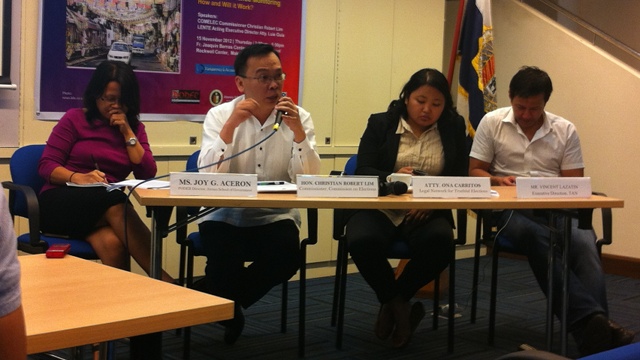
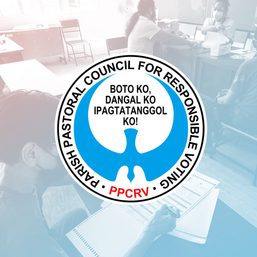
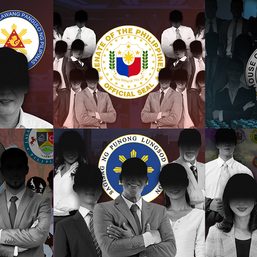
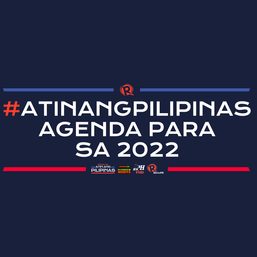

![[PODCAST] Beyond the Stories: Ang milyon-milyong kontrata ng F2 Logistics mula sa Comelec](https://www.rappler.com/tachyon/2021/11/newsbreak-beyond-the-stories-square-with-topic-comelec.jpg?resize=257%2C257&crop_strategy=attention)
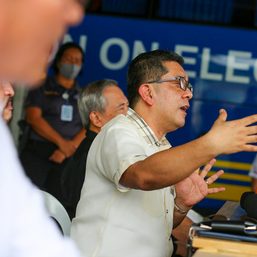
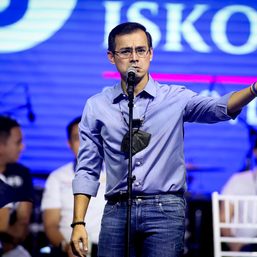

![[Free to disagree] How to be a cult leader or a demagogue president](https://www.rappler.com/tachyon/2024/04/TL-free-to-disagree.jpg?resize=257%2C257&crop_strategy=attention)
![[OPINION] Can Marcos survive a voters’ revolt in 2025?](https://www.rappler.com/tachyon/2024/04/tl-voters-revolt-04042024.jpg?resize=257%2C257&crop=251px%2C0px%2C720px%2C720px)
![[Edgewise] Quo vadis, Quiboloy?](https://www.rappler.com/tachyon/2024/03/quo-vadis-quiboloy-march-21-2024.jpg?resize=257%2C257&crop_strategy=attention)

![[OPINION] Sara Duterte: Will she do a Binay or a Robredo?](https://www.rappler.com/tachyon/2024/03/tl-sara-duterte-will-do-binay-or-robredo-March-15-2024.jpg?resize=257%2C257&crop_strategy=attention)
There are no comments yet. Add your comment to start the conversation.